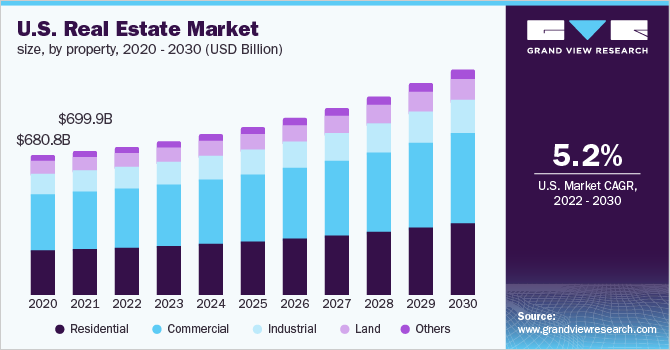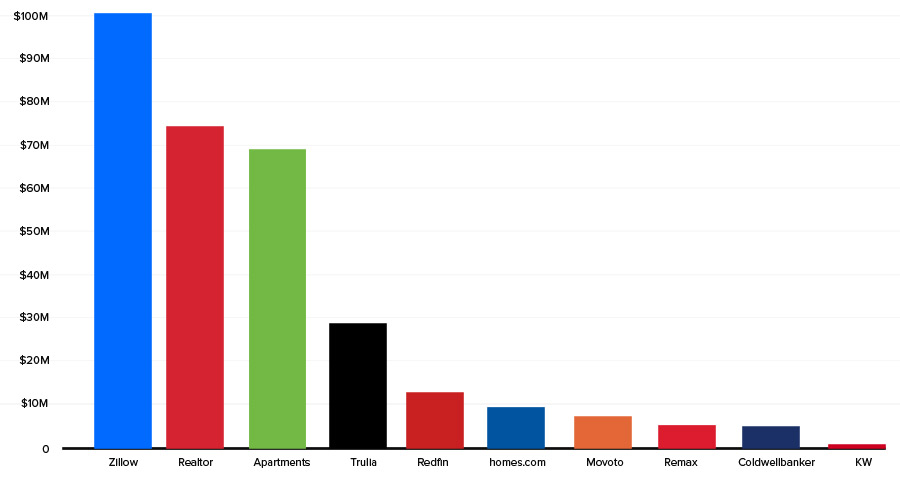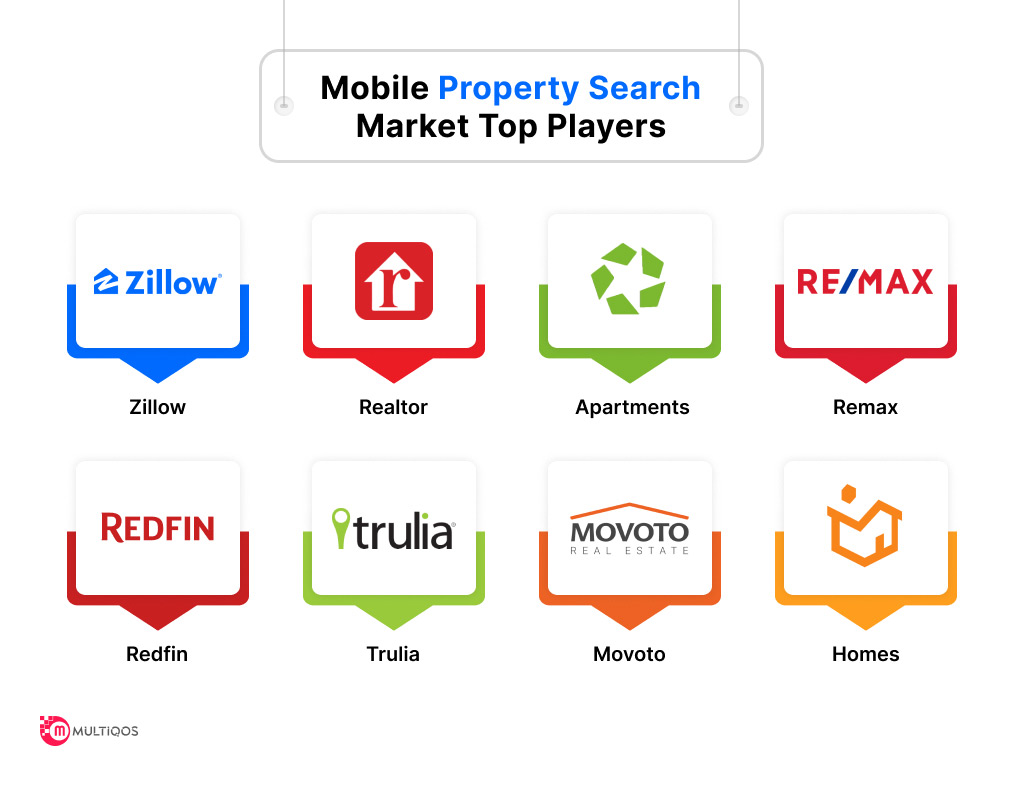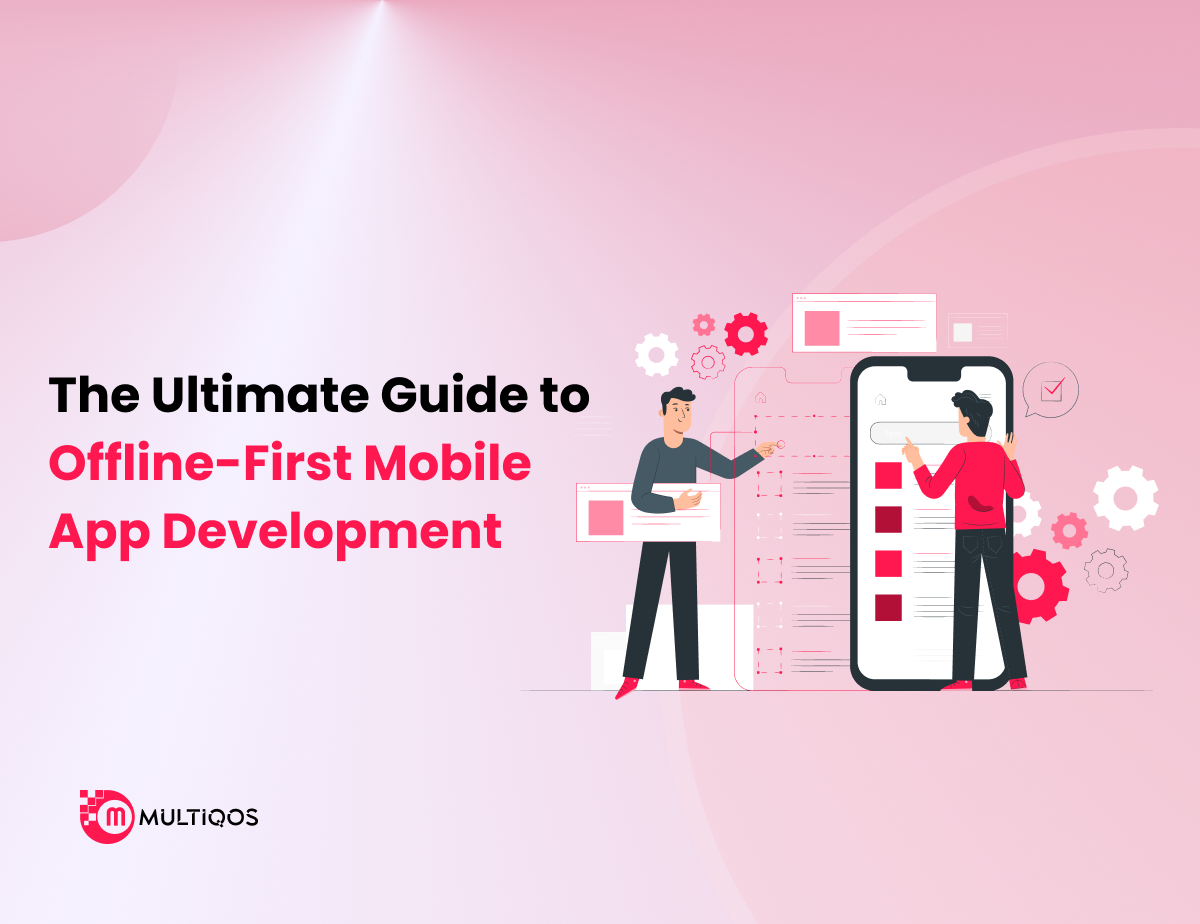How Much Does It Cost to Create A Real Estates App like Zillow or Trulia?
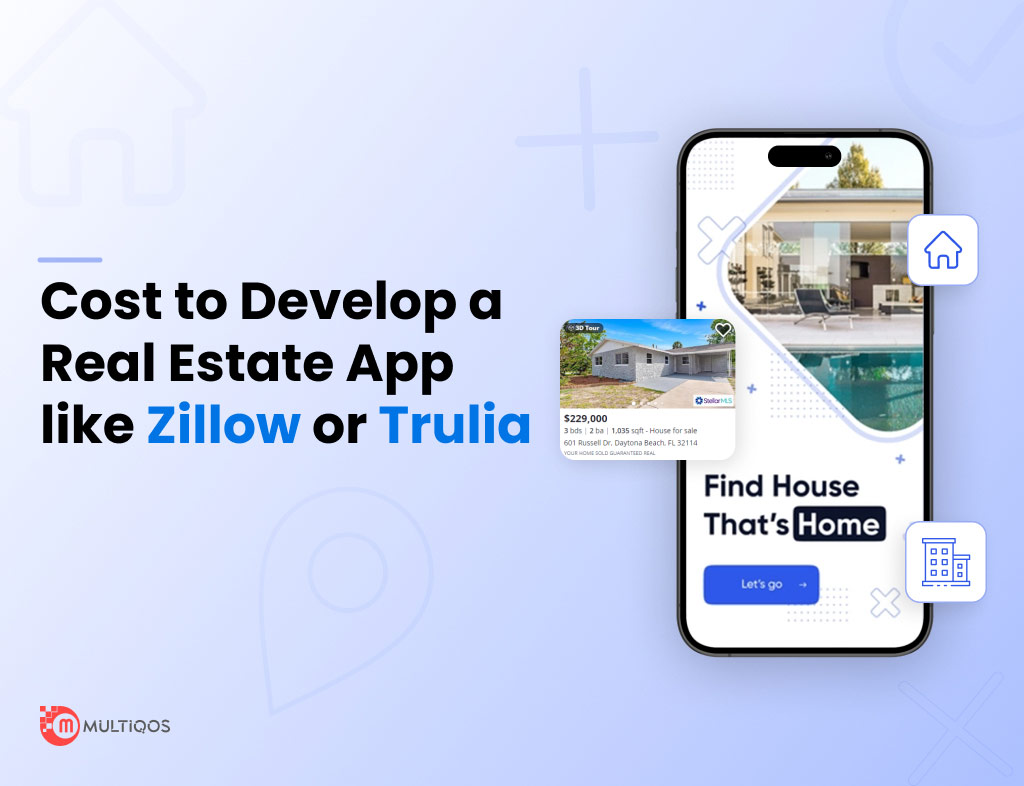
Real property is remodeling in step with rising virtual developments and transferring client tastes, much like each different area of the economy. You must travel across locations with each customer, set up meetings, prove that your offer is the finest, and then engage in difficult negotiating talks. Even so, there is no assurance that you will be successful in sealing the sale.
Furthermore, after going through all these headaches, the leads may contact your rivals, explain what you are providing, and complete the transaction for less money. Now, all of your efforts could be more useful.
But what if you can change this?
Fortunately, it is getting easier for modern realtors to draw in and keep leads since they are adopting mobile applications to handle all the heavy lifting. Thus, real estate mobile app creation has become profitable with the success of real estate apps like Zillow, Trulia, Zumper, and Realtor.com, and for all the right reasons.
Since the market is booming, you can take advantage of several chances. In this post, we can learn the technique of growing an app like Zillow and what kind of it’d fee you. But is investing in real estate a wise choice? To understand that, let us start with understanding the market scenario…
Real Estate Market Analysis
Well, one of the global markets with the fastest growth is real estate applications. The market for real estate apps has rapidly expanded in recent years. The marketplace is expected to develop from $9.12 billion in 2021 to $10.06 billion in 2022, with a predicted CAGR of 10.2%, according to The Business Research Company.
Further, the website also predicted that in 2026, the market will be worth $14.61 billion, while according to Globe News Wire, the global sales of real estate software are anticipated to reach $15.8 billion by 2027 with a CAGR of 8.9%.
Which Top Real Estate Websites Record the Most Traffic Each Month?
In the realm of real estate, online platforms have become indispensable tools for individuals seeking to buy, sell, or rent properties. The performance of these websites is often gauged by the volume of monthly traffic they receive. Let’s delve deeper into the monthly traffic statistics of leading real estate websites, offering insights into their wide-ranging appeal and extensive user base.
Source : strategicagent.com
Here is a compilation of the monthly traffic recorded by the top real estate websites:
- Zillow.com: 103.5 million
- Realtor.com: 74.3 million
- Apartments.com: 69.4 million
- Trulia.com: 28.4 million
- Redfin.com: 12.1 million
- Homes.com: 9.7 million
- Movoto.com: 6.4 million
- Remax.com: 5.65 million
- Coldwellbanker.com: 5.25 million
- KW.com: 395,000
Statistics reveal that Zillow, a prominent online real estate platform stands as the undisputed leader in user traffic in the US real estate market. Its user-centric approach, extensive property listings, and valuable tools have propelled it to the forefront of the industry. As online real estate platforms grow, Zillow dominance is expected to persist. This will reinforce its position as the preferred choice for real estate buyers. With an average of 103.5 million visitors per month, Zillow holds a firm grip on the top spot in terms of user engagement in the real estate market. This impressive figure highlights the platform’s widespread popularity and ability to attract a massive audience of homebuyers, sellers, and renters.
Must-Have Advanced Features for Real Estate Apps Like Zillow & Trulia
The creation of an app with only the must-have features would not be sufficient due to the rising competition in the real estate industry. Although it might slightly increase the Zillow app development cost, you will need to include a few more features to make it stand out and get an advantage over rivals. Zillow and Trulia, popular and widely used real estate applications, offer a range of features that make property hunting easier and more efficient. Whether you are a homebuyer, seller, or renter, these features contribute to the app’s appeal and usefulness in the real estate market.
Let’s look at the most trending features:
-
Comprehensive Property Search:
The Zillow app offers a comprehensive property search feature, providing users with a powerful search engine to explore a vast database of property listings. Users can filter their search based on various criteria, such as location, price range, number of bedrooms and bathrooms, and more. This feature enables users to quickly find properties that meet their specific requirements.
-
Interactive Maps and Neighborhood Information:
The app integrates interactive maps that display properties in the desired area. Users can explore neighbourhoods, access local amenities, and obtain valuable information about schools, crime rates, and transportation options. This feature helps users gain a better understanding of the surrounding community and enables them to make informed decisions.
-
Minimal Listing Fees:
Listing fees are the main reason why realtors and advertising frequently switch between real estate apps. Although eliminating the listing costs entirely would be utterly unprofitable, you should maintain them reasonably compared to comparable apps now available on the market. You may even waive the first month’s user costs. This would apply for a certain amount of time.
-
Chatbots:
You may respond to inquiries from users of your real estate application around-the-clock by adding a chatbot. Customers will be able to learn more about the features and services of your app, and you will be better equipped to respond to their commonly asked questions. Additionally, you will spend less on customer assistance.
-
Organizational Analysis:
Much data is required for a real estate application to reach the appropriate people at the right time. Additionally, these applications must maintain, analyze, filter, and show a sizable database of real estate listings. So, to target the appropriate customers, display advertising, and offer a flawless user experience, you must evaluate all of this data. Business intelligence refers to all the conclusions you draw from this data, and it is now a critical element of success for many firms.
-
Zestimate:
Zillow proprietary feature estimates property market value. With this tool, users can obtain an approximate home value based on market trends and comparable sales. This feature is valuable for homeowners who want to determine the value of their property or for buyers who want to evaluate the potential value of a property.
-
Saved Searches and Alerts:
Users can save their preferred search criteria and receive notifications when available properties match their preferences become available. This feature ensures that users stay updated on the latest listings that meet their requirements, saving time and effort in manual searches.
-
Mortgage Calculator:
The Trulia app includes a mortgage calculator that allows users to estimate their monthly mortgage payments. This can be done by inputting the loan amount, interest rate, and other relevant factors. This tool helps buyers determine affordability and understand property purchase financial aspects.
-
3D Home Tours:
Giving your users a 3D view of the property can enhance their experience. This will speed up the purchasing procedure. Due to the increased usage of your app, this feature might also help you strengthen consumer engagement. This immersive function offers customers with a practical view of the property’s layout. This allows them to evaluate the space and envision themselves in the home. However, adding these capabilities to your app will cost you a bit more money.
Saved Favorites and Notes: Users can save their favorite listings and add personal notes to remember relevant details about each property. This feature streamlines decision-making by enabling users to compare and review their preferred options.
Instant Share and Contact: The app enables effortless sharing of listings with others through email, text messages, or social media platforms. Additionally, users can directly contact agents or property owners through the app, making it convenient to ask questions or schedule property viewings.
Now that you know the processes involved in creating a real estate application similar to Zillow or trulia, let’s learn about the tech stack required to create one. Here are the key components typically involved in building a real estate application:
Technology Stack Needed for Apps Like Zillow and Trulia
Real estate app development and maintenance services require technical information, and a developer has to have a solid understanding of the tech stack. The list for creating a real estate app is provided below:
- Frameworks and Libraries: Next.js, Node.js, React
- Programming Languages: HTML, Java, CSS, JavaScript, and PHP
- Domain Name Services: Cloudflare CDN, Amazon Route 53, Infoblox NIOS, GoDaddy premium DNS, Google Cloud DNS or UltraDNS
- Content Delivery Networks: Cloudflare CDN, Microsoft Azure CDN, Amazon CloudFront or Rackspace Cdn, Google Cloud CDN
- Web Accelerators: Cloudflare Website Optimization, Amazon DynamoDB, AWS Global Accelerator, Azure Singular Service, or ApacheBooster
- Business Tools: Gmail, Slack, Jira, Facebook Workplace, WordPress
- Applications and Data: Python, NGINX, MySQL, Google Drive, AWS Lambda, Amazon S3, Amazon Elastics, Amazon Aurora, Amazon RDS, Amazon LightSail, MongoDB, and Redis
- DevOps: Docker, BitBucket, Git, Visual Studio, Code, Ansible, Docker Compose, New Relic, Sentry, Terraform, Kibana
- Utilities: Amazon SNS, AWS Elasticate, AWS Chatbot, ElasticSearch, Postman, Twilio SendGrid
- Core Location: Google Map or Apple Maps.
Average Cost to Make a Real Estate Application Like Zillow or Trulia?
Various factors will affect how much it costs to develop a real estate app comparable to Zillow or Trulia. The program’s complexity, the development team’s size, the development business’s location, etc., are a few examples of these criteria. Depending on the location, the development team you select to design the real estate app may charge anything from $25 to $50 per hour. On average, actual property app improvement expenses with the essential capabilities will fee between $10,000 and $25,000, while the costs for sophisticated features might reach up to $50,000.
After careful analysis of the features and technology stack mentioned earlier, we have established a baseline cost range. Any adjustments made to the features or technology stack will impact the overall development cost.
To ensure you stay on track with your budget, consider developing a Minimum Viable Product (MVP). This approach allows you to validate your app idea and gather feedback from users before investing your entire budget in full-scale app development. Once your app is designed and validated, it’s essential to explore various monetization methods that align with your business goals. This will enable you to generate revenue from your app and support its continued development and growth.
Monetization Strategies for Your custom real estate mobile app development Journey
When it comes to monetizing your real estate mobile app, there are several effective strategies we recommend to our clients:
-
Offer ads slots to property management companies:
Offer advertising opportunities within your app to property management companies. They can promote their listings, services, or featured properties to your app users, generating revenue through advertising partnerships.
-
The Premier Service for Real Estate Agents:
Create a premium service package tailored specifically for real estate agents. This can include enhanced listing visibility, advanced analytics, lead generation tools, or additional marketing features. Charge a subscription or one-time fee for agents to access these premium services, providing them with added value and boosting your revenue.
-
Subscription Model:
Introduce a subscription-based model where users pay a recurring fee to access premium features and services. This could include features like saved searches, alerts, personalized recommendations, or enhanced property insights.
-
Data Licensing:
Explore the option of licensing your app’s data, such as property listings, market trends, or neighborhood insights, to other businesses, research organizations, or data analytics companies. This can generate revenue through data access and usage fees.
-
Sponsored Content and Partnerships:
Collaborate with brands or businesses that align with the real estate industry, such as home decor brands or moving services. Offer sponsored content or partnership opportunities within your app, providing exposure and driving revenue through sponsored posts, featured listings, or promotional campaigns.
-
Ad Slots for Mortgage Lenders:
Collaborate with mortgage lenders, home insurance providers, or other businesses related to the real estate industry. Allow them to advertise their services to your app users through ad slots, generating revenue through sponsored content or partnerships.
It’s imperative to note that while these monetization strategies can contribute to your app’s profitability, achieving profitability may take time and effort. Real estate app development costs may not be covered solely through initial revenue, as establishing your presence in the competitive mobile space requires continuous growth and user engagement.
By implementing effective monetization strategies and focusing on user acquisition and retention, you can establish a sustainable revenue stream. This will help cover your real estate app development costs with profits.
How Can MultiQoS Help You with Real Estate Mobile App Development?
MultiQos is one of the top mobile app development companies in the USA, producing effective mobile apps. The team of creative real estate app developers specializes in creating real-time property apps powered by disruptive technologies that can instantly meet the demands of all your stakeholders in the present and the future.
Conclusion
We trust that you now understand the real estate app development cost and other relevant aspects associated with it. With this knowledge, you can bring your bold idea to life and create an application that provides immense value. Popular real estate applications like Zillow or trulia provide helpful services to customers and various online business expansion prospects for real estate brokers regarding hassle-free property transactions.
However, you should be clear on the project’s objectives before delving further into the technology stack and platform requirements. Along with analyzing every app already accessible in the store, you should explore the market and do comparative research. Additionally, you may add a few extra features to your app to boost its worth and make it look more appealing. If you’re ready to embark on this exciting journey, simply reach out to us, and we’ll be thrilled to turn your vision into reality.
Do You Want to Take Your Real Estate Business Online?
Our experts leverage the latest technology to develop innovative real estate apps with advance features that simplify transactions.
FAQ on Real Estate App Development
Developing an app for real estate starts with investigating the market and competitors. Next, it’s time to start the discovery phase and choose a trustworthy group of development professionals. Developers produce an MVP, create the design, complete the main version of the product, test it, and then release it based on your concept, target audience, budget, and app features.
According to real estate app development companies, the apps can generate revenue through numerous monetization strategies, including commission on each transaction, highlighted listings for real estate brokers, selling ad spots to other companies, and subscription models.
Creating a real estate search engine from scratch will be extremely expensive. Your real estate mobile app or website should use third-party APIs from reputable sources like Elasticsearch.
Choosing the best real estate app development company depends on your specific requirements and preferences. It is recommended to consider factors such as expertise, experience, portfolio, client reviews, and the company’s ability to deliver innovative and high-quality solutions. Conduct thorough research, compare various companies, and reach out to discuss your project goals to find the perfect match for your requirements.
Zillow is one of the largest and most popular real estate platforms. It provides a comprehensive database of property listings, neighborhood information, mortgage calculators, and a variety of tools for buyers, sellers, and renters. Trulia, Redfin, and Realtor.com are also significant players in the real estate platform space, each with its own unique features and strengths.
Blockchain technology has the potential to revolutionize the real estate industry in multiple ways. It can enhance transparency, security, and efficiency in property transactions by offering a decentralized and immutable ledger system. Smart contracts powered by blockchain can automate property transfers, title registrations, and rental agreements. This reduces the need for intermediaries and enhances trust between parties. Blockchain can also enable fractional ownership, tokenization of real estate assets, and streamlining property ownership records verification.
The time required to develop a minimum viable product (MVP) for a real estate application can vary based on factors such as the complexity of features, design requirements, and team size. On average, it takes 2 to 6 months. However, it’s recommended to consult with an app development team for a more accurate estimate based on the specific scope of your project.
Get In Touch

